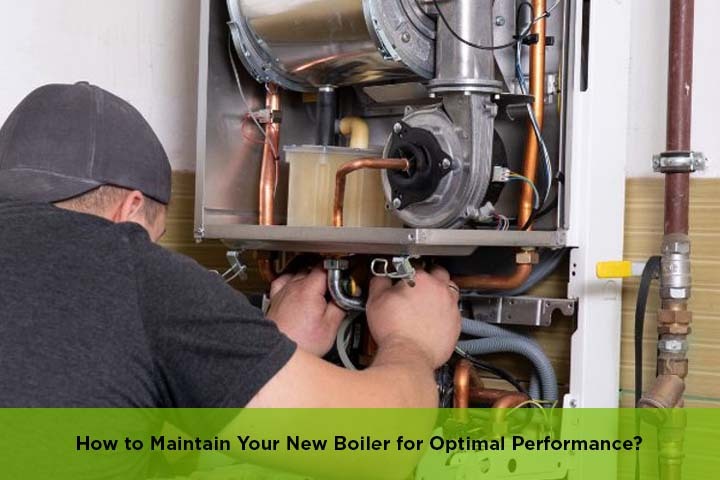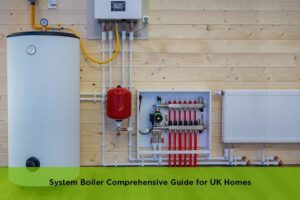Getting a new boiler is something like giving your house a new lease on life. A new boiler heats the rooms better, is more efficient, and makes the cold winters so much more bearable. But like every responsible device, it needs some maintenance to keep doing its job efficiently.
If you have recently purchased a new boiler, the chances are you are wondering what’s next. The great news is—taking care of it is simple. A couple of easy habits can make all the difference to the boiler’s longevity, and efficiency, and saving you money in the process. Let’s work through what it takes to keep the boiler happy, healthy, and ready for anything.
Do Boilers Need Regular Maintenance?
Yes, boilers need regular servicing so that they can work effectively. Just like the car needs to be serviced, so does the boiler to ensure that the house is kept warm and money is saved on bills.
You can simply start with the basics: know how to use the thermostat, set the timer, and read the temperature. It’s the small things that make the boiler function better.
It’s okay to do minor things such as cleaning around the boiler and leak checks, but anything else should be left to the expertise of a Gas Safe registered engineer. They’re the only ones with the training to repair any serious faults in the correct way.
Your boiler also has important safety features:
- Pressure gauge – Tells you if the boiler pressure is too high or too low.
- Safety valve – Stops the buildup of excessive pressure.
- Flame sensor – Check if the flame is working safely.
- Reset button – Lets you restart the system if it shuts off.
Checking Your Boiler’s Efficiency and Performance
The most efficient method for saving energy and lowering gas bills is to monitor the performance of your boiler.
Boiler efficiency simply means how much energy it uses to heat your home. A boiler that is about 90% efficient turns 90% of the energy into heat. It wastes the rest. The higher the percentage, the better it is for you—and the planet.
Here’s how to check your boiler’s performance:
- Look at your energy bills: If your gas use has gone way up but your heating habits have not changed at all, it might mean that your boiler is losing efficiency.
- Check the water temperature: If your hot water keeps going hot and cold, it could mean a problem with the heat exchanger.
- Know your boiler’s age: Older boilers (15 years old or more) tend to be less efficient.
To keep it running well, get a professional service once a year, check the pressure (usually between 1 and 1.5 bars), and make sure your home is well insulated to stop heat from escaping.
How to Maintain Your New Boiler for Optimal Performance?
Keeping your new boiler in top condition does not have to be so complicated, but it does require servicing at regular intervals. Regular checks and maintenance can make a difference to the efficiency of the system, its lifespan, and its performance.
Most importantly, proper maintenance of the heating system avoids breakdown at the most inconvenient moment. Especially when it is the middle of winter and you need it most.
Let’s do it step by step.
Tips to Maintain Your New Boiler for Maximum Output
Some tips to make the boiler function efficiently throughout the year are:
1. Regularly Check Boiler Pressure
Your boiler will work at its best when the pressure is at its ideal level. Most boilers should be around 1 to 1.5 bars. If it’s below this, your heat won’t work.
If it’s above this, it’ll stress the system. You can try the pressure gauge on your boiler — if it’s too high, see the manual for your boiler to make the correction.
2. Bleed Your Radiators
If the house radiators are cold or heat at a lower rate than normal, it is most likely because air is trapped. It can be removed by bleeding the radiators so that the hot water can circulate freely.
It’s an easy solution to make the system function more efficiently. Don’t forget to switch off the heat first and bleed it with the radiator key gradually until water starts to drip.
3. Check for Leaks and Sounds
Leaks, drips, or strange noises like banging or whistling can be the first indication that things are amiss. A leak can signal the failure of an internal component, while noise can be due to air or limescale buildup. Catch them early to avoid more serious, costly problems later.
4. Clean Heat Exchangers and Filters
Dirt and debris can build up inside the boiler year after year, especially in the heat exchanger and the filters. It can make the boiler less efficient.
Some filters can be washed, depending on the manual for the boiler you have, but it’s always best to have the heat exchanger serviced by an expert at the time of the annual check-up.
5. Test the Thermostat and Timer
Make sure that your thermostat and timer are in good working order. Your thermostat should be set at a comfortable temperature — generally 21°C for most homes.
With the timer, the boiler only heats the house when it needs to, so it does not waste energy. You can even use a smart thermostat for even greater control.
6. Insulate Your Pipes
Unheated or outside pipes can freeze in the cold. Insulation for the pipes (foam tubing) keeps them from freezing and losing heat. Your boiler won’t have to work so hard, and you’ll save money too.
7. Annual Servicing Schedule
The most crucial aspect to undertake in the servicing and maintenance of the boiler is to arrange for an annual servicing by a Gas Safe registered engineer.
They’ll identify faults that can’t be seen, clean internal parts, and make sure everything’s running at maximum efficiency and safety. It does more than prevent the breakdown; it also maximizes the life span of your boiler.
How to Maximize Your Boiler's Efficiency?
Here is how you can maximize the efficiency of your boiler:
1. Decrease the Flow Temperature
If you have a Combi boiler, try lowering the flow temperature — the temperature the radiators heat at. Most are set at around 80°C, but lowering it to 60°C will save you money. Don’t worry if it makes the house feel cooler at first — you can experiment until it’s right.
2. Using a Thermostat and Smart Controls
A thermostat prevents the house from getting too hot by turning the heat off when it reaches the temperature you’ve set.
Smart controls accomplish the same thing with the added advantage that you can control the heat remotely with your smartphone — only when needed.
3. Bleed the Radiators
If the top of the radiators is cold but the bottoms are hot, it is due to trapped air preventing the heat from circulating. Radiators can be bled to release this air so it is easier for the boiler to work less to heat the house.
4. Flush Your System Occasionally
Over time, sludge and rust can build up in your system. An expert system flush cleans out this mess. It makes the water flow more freely and improves heat transfer. If you’re getting a new boiler fitted, ask them to fit a system filter too—it prevents build-up in the future.
5. Turn On Your Heater In the Summer (For Just a Little While!)
Use your boiler for 10-15 minutes per week throughout the summer. This keeps things moving and avoids breakdowns during the cold weather. It’s an inexpensive step that can save you the cost of expensive repair bills later.
6. Maintain Proper Ventilation
Your boiler needs proper airflow to burn the fuel. Don’t block vents and grilles and never cover them. Poor ventilation can cause your boiler to work inefficiently and dangerously.
Boiler Troubleshooting: Quick Fixes You Can Do Yourself
If the boiler is not performing to its standard, it can be frustrating — but not every issue needs an engineer. Let’s go through the simple checks you can do yourself:
1. No hot water or heat
- Do a thermostat check — is it the right temperature?
- Monitor the boiler pressure — it should be 1 to 2 bars. If it is below this level, it will need to be refilled.
- Make sure the power and gas lines are switched on.
2. Unusual sounds (banging, gurgling, or whistling)
- Trapped air in the system is the probable culprit — bleed your radiators.
- Either excessive limescale deposition or low pressure are the likely causes.
3. The boiler keeps shutting off
- Either the low water pressure or the clogged condensate pipe can cause this.
- Reset your boiler — refer to your manual for instructions on doing this safely.
4. Radiators not functioning correctly
- If they’re cold at the top, they’re most likely to need bleeding.
- If they’re cold at the bottom, it’s possible that the system’s got sludge in it — you’ll need to have it professionally cleaned.
5. The pilot light keeps going out
- This can either be a faulty thermocouple or the draft blowing it out.
- It’s always worth having this checked by a Gas Safe registered engineer.
If you’ve attempted these and the problem persists, call an engineer. Never attempt to fix gas or electrical issues yourself.
The Bottom Line
Keeping your boiler efficient does not need to be hard. Routine servicing, easy energy-saving tips, and early repair to minor problems can make your boiler last for a longer period, be more efficient, and save you money in the long run.
Whether it’s bleeding the radiators, lowering the flow temperature, or checking the pressure every now and then, small things can make big differences.
But remember—if it looks wrong or seems risky, don’t try to fix it yourself. Always use a Gas Safe registered engineer. A serviced boiler saves you money and keeps you and your home safe and warm all year round.
FAQs
Decrease the flow temperature to around 60°C, bleed the radiators, and insulate the pipework. Servicing also keeps the boiler in proper condition.
Use the thermostat or smart controls, clean the boiler, and book an annual service. Don’t forget to ventilate and check for leaks or drops in pressure.
Get an annual service, have the pressure checked, and run the boiler briefly during the summer. Clearing the radiators and the pipework of dirt and air also avoids problems.
No, the newest condensing boilers can never be 100% efficient. They normally reach about 92–94%, and some energy is always lost when they’re operating. Routine servicing keeps efficiency at its maximum.







